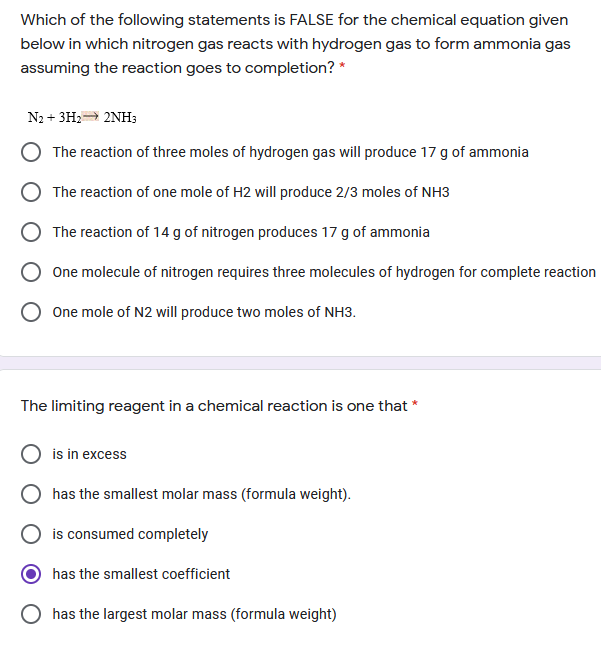Which of the following statements is FALSE for the chemical equation given below in which nitrogen gas reacts with hydrogen gas to form ammonia gas assuming the reaction goes to completion? * N2 + 3H;= 2NH3 The reaction of three moles of hydrogen gas will produce 17 g of ammonia The reaction of one mole of H2 will produce 2/3 moles of NH3 O The reaction of 14 g of nitrogen produces 17 g of ammonia One molecule of nitrogen requires three molecules of hydrogen for complete reaction One mole of N2 will produce two moles of NH3. The limiting reagent in a chemical reaction is one that * is in excess has the smallest molar mass (formula weight). is consumed completely has the smallest coefficient has the largest molar mass (formula weight)
Which of the following statements is FALSE for the chemical equation given below in which nitrogen gas reacts with hydrogen gas to form ammonia gas assuming the reaction goes to completion? * N2 + 3H;= 2NH3 The reaction of three moles of hydrogen gas will produce 17 g of ammonia The reaction of one mole of H2 will produce 2/3 moles of NH3 O The reaction of 14 g of nitrogen produces 17 g of ammonia One molecule of nitrogen requires three molecules of hydrogen for complete reaction One mole of N2 will produce two moles of NH3. The limiting reagent in a chemical reaction is one that * is in excess has the smallest molar mass (formula weight). is consumed completely has the smallest coefficient has the largest molar mass (formula weight)
Introductory Chemistry: A Foundation
9th Edition
ISBN:9781337399425
Author:Steven S. Zumdahl, Donald J. DeCoste
Publisher:Steven S. Zumdahl, Donald J. DeCoste
Chapter9: Chemical Quantities
Section: Chapter Questions
Problem 4QAP: hich of the following statements is true for the reaction of nitrogen gas with hydrogen gas to...
Related questions
Question
Hello please help me with this... this is just short. no need for solution with the number with solving

Transcribed Image Text:Which of the following statements is FALSE for the chemical equation given
below in which nitrogen gas reacts with hydrogen gas to form ammonia gas
assuming the reaction goes to completion? *
N2 + 3H2= 2NH3
The reaction of three moles of hydrogen gas will produce 17 g of ammonia
The reaction of one mole of H2 will produce 2/3 moles of NH3
The reaction of 14 g of nitrogen produces 17 g of ammonia
One molecule of nitrogen requires three molecules of hydrogen for complete reaction
One mole of N2 will produce two moles of NH3.
The limiting reagent in a chemical reaction is one that *
is in excess
has the smallest molar mass (formula weight).
is consumed completely
has the smallest coefficient
has the largest molar mass (formula weight)
Expert Solution
This question has been solved!
Explore an expertly crafted, step-by-step solution for a thorough understanding of key concepts.
This is a popular solution!
Trending now
This is a popular solution!
Step by step
Solved in 5 steps

Recommended textbooks for you

Introductory Chemistry: A Foundation
Chemistry
ISBN:
9781337399425
Author:
Steven S. Zumdahl, Donald J. DeCoste
Publisher:
Cengage Learning

Chemistry: Principles and Reactions
Chemistry
ISBN:
9781305079373
Author:
William L. Masterton, Cecile N. Hurley
Publisher:
Cengage Learning

Chemistry for Engineering Students
Chemistry
ISBN:
9781285199023
Author:
Lawrence S. Brown, Tom Holme
Publisher:
Cengage Learning

Introductory Chemistry: A Foundation
Chemistry
ISBN:
9781337399425
Author:
Steven S. Zumdahl, Donald J. DeCoste
Publisher:
Cengage Learning

Chemistry: Principles and Reactions
Chemistry
ISBN:
9781305079373
Author:
William L. Masterton, Cecile N. Hurley
Publisher:
Cengage Learning

Chemistry for Engineering Students
Chemistry
ISBN:
9781285199023
Author:
Lawrence S. Brown, Tom Holme
Publisher:
Cengage Learning

Introductory Chemistry: An Active Learning Approa…
Chemistry
ISBN:
9781305079250
Author:
Mark S. Cracolice, Ed Peters
Publisher:
Cengage Learning


Chemistry: The Molecular Science
Chemistry
ISBN:
9781285199047
Author:
John W. Moore, Conrad L. Stanitski
Publisher:
Cengage Learning